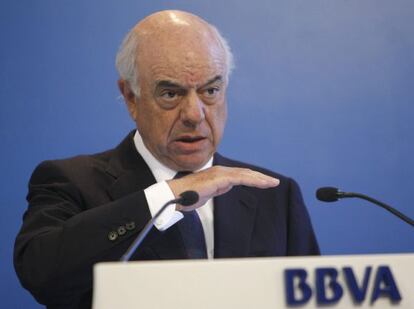"The perception of Spain has changed dramatically with this government"

He is one of the most-traveled of Europe's bankers, even to the point of being criticized from some quarters for an almost obsessive interest in the international scene. But Francisco González does have an excellent position from which to sample the opinion in which Spain is held in boardrooms across the world. "The perception of Spain has changed completely; there has been a dramatic turnaround with the new government," he says in his first interview for EL PAÍS.
The president of Spain's second-biggest lender, who was helped on his way up in the banking sector by the Popular Party, has harsh words of criticism for the previous Socialist administration: "It took Spain to the brink of disaster due to the loss of credibility."
But what about the blame attached to members of his own sector? "This crisis is such a deep one due to very flexible regulation, lax supervision, misguided economic policy and some very bad banking practices all over the world. In Spain this was also the case in some of the cajas [savings banks]. It is only just that those who did things wrong should pay for it. That is the reply society is clamoring for. At BBVA we are proud because we have got things just about right."
Asked about the financial reform introduced by the new PP government, González said it would mark only the start of the sector's transformation. "It will be the markets that decide whether it has gone well and what solution will be found for unviable entities. [...] We need better corporative government, greater transparency and, in Spain, we have the chance to leave behind some of the disgraceful practices we have seen in the past."
González also said that BBVA would be happy to sign up to the government's proposed code of good practice for banks with regard to families unable to keep up with mortgage payments, with the objective of avoiding the need for evictions.
"In our case, for every 10 families in difficulties we have found solutions for nine, lengthening the repayment schedule or freezing interest. We have been doing this since 2008. It is true that there is a 10 percent for whom we have not found the right solutions, but we are among those banks that have had fewest problems in this area."
The labor reform will only create jobs if credit flows are restored"
The banker justifies the labor reform decree passed by Prime Minister Mariano Rajoy's Cabinet earlier this month, which has been criticized by the Socialists and labor leaders for making it too easy to fire and reduce workers' salaries.
"What these changes do is to tackle chronic problems that Spain has had for 40 years. Our unemployment rate is double that of the countries around us because something was wrong and it was time to do something about it. The reform will provide greater flexibility and will create jobs if, with the changes to the financial system, credit flows are restored. In the short term, I don't know if unemployment will continue to increase.
So given the still-uncertain outcome of the new reforms, what has changed so much since Rajoy came to power in late December? "This may not be what a banker ought to say, but in recent years Spain has had a problem of runaway spending and a loss of credibility that took us to the brink of disaster. The change of government in Spain is giving us a chance to recover that credibility. Now we have to see if all of this brings about job creation, which is the most important thing. If it doesn't, it will have been a failure."
So in terms of credibility among the investment community, at what level can we expect to see Spain's risk premium at the end of this year? "If things turn out as they look like they will within the European Union, it should be below 300 points. If that is not the case, then this means we are not headed in the right direction."
Tu suscripción se está usando en otro dispositivo
¿Quieres añadir otro usuario a tu suscripción?
Si continúas leyendo en este dispositivo, no se podrá leer en el otro.
FlechaTu suscripción se está usando en otro dispositivo y solo puedes acceder a EL PAÍS desde un dispositivo a la vez.
Si quieres compartir tu cuenta, cambia tu suscripción a la modalidad Premium, así podrás añadir otro usuario. Cada uno accederá con su propia cuenta de email, lo que os permitirá personalizar vuestra experiencia en EL PAÍS.
¿Tienes una suscripción de empresa? Accede aquí para contratar más cuentas.
En el caso de no saber quién está usando tu cuenta, te recomendamos cambiar tu contraseña aquí.
Si decides continuar compartiendo tu cuenta, este mensaje se mostrará en tu dispositivo y en el de la otra persona que está usando tu cuenta de forma indefinida, afectando a tu experiencia de lectura. Puedes consultar aquí los términos y condiciones de la suscripción digital.








































